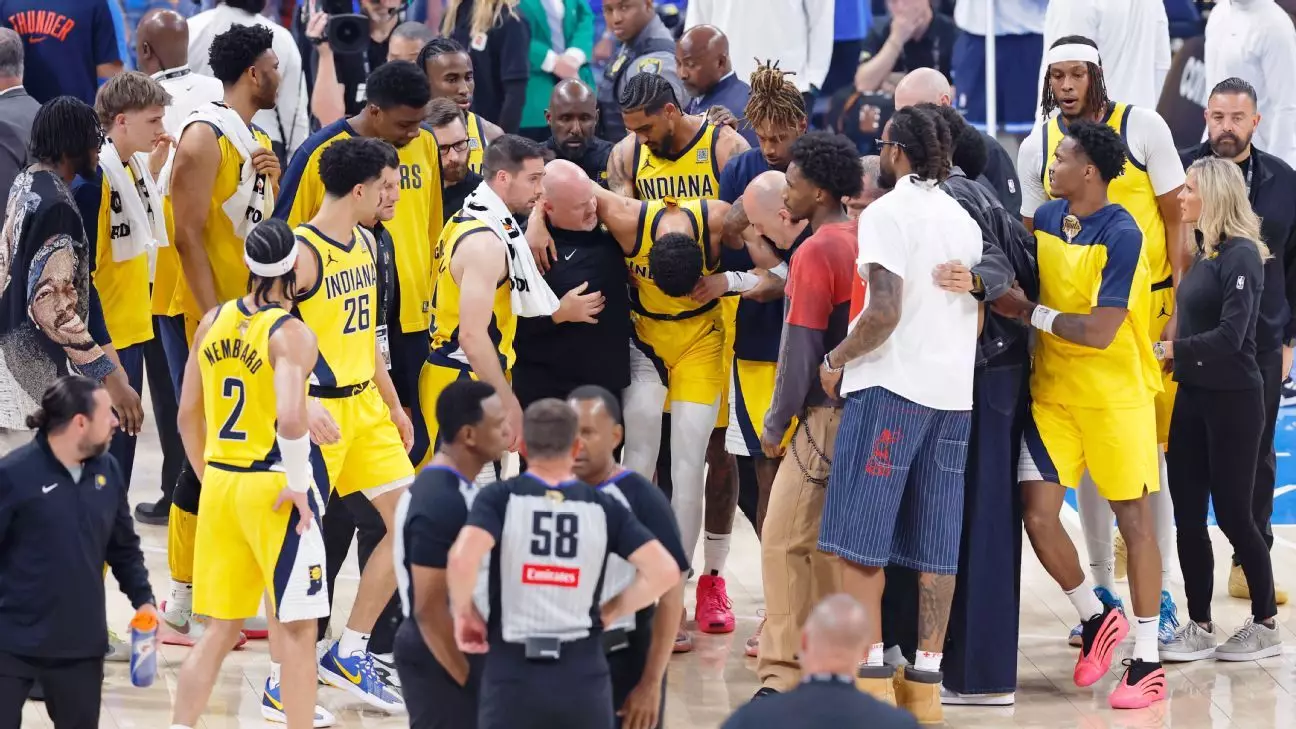In the world of professional sports, the line between bravery and folly often blurs. Indiana Pacers’ star Tyrese Haliburton’s decision to play through a calf strain during the NBA Finals—and ultimately suffer a devastating Achilles tear—has shed light on this precarious balance. Haliburton’s emotional social media statement, where he remarked, “I’d do it again, and again after that,” reveals a warrior’s mentality that many admire. Yet, it raises questions about the ethics of pushing oneself to the brink and the potential consequences of such choices.
Too often, athletes are lauded for their willingness to sacrifice their bodies for the sake of glory. Haliburton’s fiery commitment to his team and city resonates deeply, especially in a culture that values grit over well-being. However, what happens when that very commitment leads to irreversible injury? By romanticizing a “play through the pain” ethos, we risk creating a narrative that equates suffering with worthiness. Haliburton’s ambition is undeniable, but is it worth the long-term physical and mental toll?
A Glimpse into the Mind of an Athlete
Haliburton’s heartfelt lament captures the harsh realities athletes face when confronted with injury. His description of feeling “shock” and “unfathomable frustration” encompasses a myriad of emotions that can affect mental health. The public often overlooks this psychological toll when lauding athletes for their fortitude. Society celebrates their sacrifice without addressing the hidden complexities within those sacrifices.
The notion that “pain is weakness leaving the body” is a toxic mantra that needs to be dismantled. Haliburton’s expressive frustration about facing clichés like “you’ll come back stronger” highlights the disconnect between public perception and personal experience. The weight of expectations can sometimes be even heavier than the physical burdens these athletes bear. As Haliburton humorously points out, it’s a cliché that doesn’t apply to the hurt, a reminder that recovery often involves more than just physical healing.
A Team’s Emotional Landscape
Haliburton’s injury not only impacts him individually but sends shockwaves through the entire Pacers team. Their run to the NBA Finals was a collective dream, and losing their key player in such a dire moment is disheartening. His commitment to “fight for this city and my brothers” symbolizes a bond that encapsulates sportsmanship, yet it also invites scrutiny about how much sacrifice teammates should expect from one another.
Every member of the Pacers feels the weight of Haliburton’s loss. One can only speculate how the team’s morale would shift with a robust, confident leader on the court rather than a sidelined player grappling with his anguish. Mental health should be as important as physical health, and one hopes that the Pacers can rally together not just in their shared loss but in an understanding of their individual struggles.
The Clichés That Haunt Us
Haliburton’s post-surgery reflections provide an insightful window into the mind of an athlete facing adversity. The phrase, “I get to go through this,” encapsulates a rare perspective where one can find gratitude even in suffering. However, it also carries a burden, as if pain is something to be endured and appreciated rather than avoided. In the realm of liberal thought, we must advocate for a more nuanced understanding of strength—one that allows room for vulnerability, an equally potent form of resilience.
As injuries like Haliburton’s mount—highlighting the fragility of human bodies and spirit—it is crucial to foster an environment that encourages players to prioritize their health over glory. The competitive spirit should not demand negligence of one’s physical integrity. Haliburton’s experience serves as a call to action: Let’s redefine courage in sports not just as fighting through pain but as the possibility of stepping back to heal.
Emotional honesty, as Haliburton has demonstrated, can pave the way for a more compassionate understanding of athletic endurance. If we can transform our conversation about sports injuries from tales of bravery to discussions about health and well-being, we may unearth deeper connections between players, teams, and fans—understanding that triumph does not solely stem from conquest but from a harmonious blend of strength, vulnerability, and support.


Leave a Reply